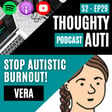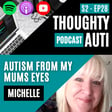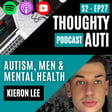
The Stigma Of Cerebral Palsy
What are the stigmas and stereotypes attached to cerebral palsy? What is daily life with dystonia like? What is cerebral palsy and how does it develop?
In this podcast, Thomas Henley talks to Emma Stone, a cerebral palsy advocate (dystonia) and decorated horseriding athlete, currently studying a variety of Work Preparation modules in college and working in a local cafe.
Within this podcast, Emma aims to dispell stigma and stereotypes around cerebral palsy and bring more awareness to them and share the more intimate negative experiences they've gone through in daily life, school, physio, surgery and healthcare. She also highlights the life lessons she's picked up and details her top tips for other individuals with cerebral palsy.
Thomas’s Links: https://linktr.ee/thomashenleyUK
Emma's Blog: https://estoneblogersa.blogspot.com/?m=1
Chapters:
00:00 - 01:24 Introduction
01:24 - 05:09 Surgery and Deep Brain Stimulation (DBS)
05:09 - 08:24 Who Is Emma Stone?
08:24 - 10:55 What Is Cerebral Palsy?
10:55 - 14:19 Developing Cerebral Palsy
14:19 - 21:27 Living With Dystonia
21:27 - 32:36 Escaping Isolation With Cerebral Palsy
32:36 - 37:02 Navigating Healthcare with CP
37:02 - 39:38 Horse riding Achievements
39:38 - 46:45 Tips for Living With Cerebral Palsy
46:45 - 49:08 Identity vs Person first language
49:08 - 56:05 Stigma and Stereotypes
56:05 - 01:02:56 Final Thoughts
Song Of The Day (Listen Here) - https://open.spotify.com/playlist/5UDIyN5TSYN4zMcRoQPrG8?si=9255ed3480d840b5
Subscribe to the channel to get notified when I next go live 🙌
🗣️ My Socials and Podcast - https://linktr.ee/thomashenleyUK
🐰 My Favourite Energy Drink Powder (with L-Theanine) - https://affiliates.sneakenergy.com/s/thomashenleyuk
💻 My Amazon Store Recommendations (Sensory items, gym gear, YouTube set-up) - https://www.amazon.co.uk/shop/thomashenleyuk
🎧 Dbud Noise Cancelling Adjustable Ear Buds (20% Off with code: THOUGHTYAUTI) - https://dbud.io/bntvs5
◽️◽️◽️◽️◽️◽️
WHAT SERVICES DO I OFFER?
🎙️ Podcast, TV and Radio Guest
🗣️ Public Speaking For Events
📸 Neurodiverse Modeling (Contact for details)
📧 CONTACT: https://www.thomashenley.co.uk (hi@thomashenley.co.uk)
◽️◽️◽️◽️◽️◽️
FOLLOW MY SOCIALS ♥:
Instagram - @thomashenleyuk
TikTok - @thomashenleyuk
Facebook - Thomas Henley
Twitter - @thomashenleyuk
Linkedin - Thomas Henley
All my links: https://linktr.ee/thomashenleyuk



















